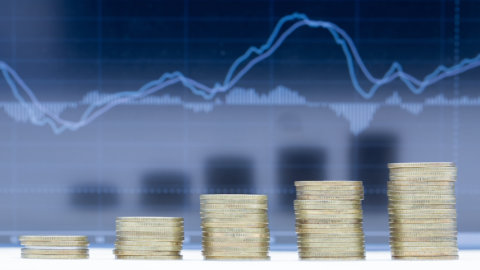It wasn't difficult to predict: the stomach ache of the markets could not end within 2-3 sessions, given the violence of the swings. And so, once the first shock had subsided, yesterday the decline returned to dominate the lists, thanks to the volatility at high levels and the renewed fears of a too rapid and too violent rise in interest rates.
Conflicting indications arriving yesterday from central banks contributed to accentuating fear: the ECB reiterated that rates must remain low for a long time to come; the Bank of England has adopted hawkish language in anticipating that rates could rise sooner and by more than already anticipated. In the US, while awaiting the debut of the new Fed chairman Jerome Powell, the often conflicting statements of the board members follow one another.
The lack of leadership of the Fed together with the signs of a recovery of inflation are not surprising the new, sharp correction of share prices and the tensions on the bond market. Complicating the picture this morning was the heavy correction of the Chinese Stock Exchange: -6% on New Year's Eve, the most delicate moment of the Dragon's financial season.
WALL STREET HAS LISSED 10% FROM THE JANUARY TOP
Thus a weekend full of fear is looming. Wall Street experienced another day of passion: the Dow Jones index (-4,15%) lost the beauty of 1.032 points; S&P 500 -3,75%, the Nasdaq does worse (-3,9%). The main indices show an overall decline of more than 10% from the highs of January 26th. Amazon (-4,68%) and Facebook (-4,77%) lead the declines of the S&P index.
Twitter (+12,11% over 30 dollars), on the high since 2015, goes against the trend. Data for the quarter, especially in terms of revenues, exceeded the goals of Wall Street analysts.
US TREASURY RAISES AUCTION YIELDS
Apparent calm in the bond market: The Treasury Bill yield is 2,82%, same as yesterday. The two-year period is stable at 2,08%. But the disappointing outcome of the thirty-year government bond auction (16 billion dollars) is scary: the Washington Treasury had to raise the yield to 3,13% to place the offer, a level not seen since March of 2017. Tensions on interest rates give a boost to the dollar, to a three-week high against the euro at 1,224.
OIL ON SIXTH DAY OF DESCENT
Despite the recovery of the US currency, oil loses new blows, crippled by the retreat of speculation and by the risk of a slowdown in Chinese consumption. Brent reached its fifth consecutive day of decline yesterday evening, at 64,8 dollars a barrel, this morning North Sea crude lost 0,7% to 64,2 dollars.
Oil stocks also fell yesterday in Piazza Affari: Eni -2,3%, this morning announced a gas discovery offshore Cyprus. Saipem -3,3%, Tenaris -3,7%.
BITTER NEW YEAR IN CHINA, TOKYO -8,6% IN ONE WEEK
The storm continued in Asian markets. Tokyo, before the closure, retreated by 2,9%. The Nikkei dropped 8,6% for the week, its worst fall in two years.
Chinese stock markets crumble. The Shanghai Composite index shows a plunge of 6%, the Csi 300 index, combined data from Shenzhen and Shanghai falls by 6,1%, Hong Kong -3,3%. The approaching Lunar Year holidays, characterized by the strong demand for liquidity, contributes to making markets vulnerable. But the fear is that the fall in quotations could bring down the already precarious financial situation of many institutions burdened by heavy debts. The yuan against the dollar moved little, moving away from the highs of 11 August 2015, when the Chinese Central Bank intervened to fix the exchange rate at 6.3194. The decreases in Seoul (-2%) focused on the Olympics and Mumbai -1% were less heavy.
Oil prices are down, while Brent reaches its lowest level in the last three months. Eni falls 2,3% which in the morning announced a gas discovery offshore Cyprus. Saipem -3,3%, Tenaris -3,7%.
MILAN, THE ONLY STILL POSITIVE STOCK EXCHANGE IN 2018
The decline obviously did not spare the European markets, which fell sharply Eurozone stock exchanges fell sharply despite the positive tones of the ECB's Economic Bulletin.
The FtseMib index (-2,26% to 22.226 points) lost most of yesterday's gains in the wake of Wall Street's weak opening. Despite the correction, the index of our blue chips remains the only one in the euro area to still maintain a positive balance since the beginning of the year (+3%), while the rest has slipped into the red: Eurostoxx index -3%.
The other markets were also weak: Frankfurt -2,62%, Paris -1,98%. Slightly better London (-1,49%). The rate signals launched by Governor Mark Carney have left their mark on the pound, which has come to gain more than one percentage point against the euro and the dollar.
ATHENS SUCCESSFULLY LAUNCHES THE NEW TITLE AT 7 YEARS OLD
The secondary market weakens (but not too much). The yield on the 10-year BTP rises to 2% and the spread with the Bund widens to 124 points (+2,56%). The yield of the new German benchmark reaches 0,8%, the highest since September 2015 and then closes at 0,77%.
An encouragement to peripheral paper comes from the placement of the awaited new Greek bond: three billion euros maturing in 2025 with a yield set at 3,5%, which attracted requests for 7 billion. Greece, EU Commissioner Pierre Moscovici said, must agree with its creditors on measures to ease Athens' medium-term debt in June, before the country exits its bailout programme.
The Treasury has announced that in the medium-long term auction on Tuesday 13 February, securities between 6,75 and 7,5 billion at 3,7 and 30 years will be offered.
UNICREDIT AND BPM RESIST THE BEAR
There are only two positive blue chips at the end of the session. UniCredit +2%. The title of the institute led by Jean Pierre Mustier is the best, on the day of reckoning. The bank has closed the fourth quarter of 2017 with 801 million euros of profit, the adjusted result is 708 million euros. The consensus expected 523 million euros.
Banco Bpm (+0,3%) communicated the data for the fourth quarter. The most relevant issue was that of capital ratios. At the end of December Common Equity Tier 1 was 12,36%. The bank has revised upwards the forecast on the reduction of non-performing loans, in 2020, the non-performing exposure (NPE) is expected to decrease to 11,5%. Cautious guidance for 2018. Operating income for the fourth quarter 2017 rose slightly compared to the third quarter, to 1,12 billion euros. The last three months of the year closed with a loss of 512 million euros.
DOWN ALL THE BLUE CHIPS, RECORDATI (-8%) IS THE BLACK JERSEY
All the other stocks in the main basket are in red, starting with the most indebted companies. All utilities down. Enel -3%, Snam -2,5%, A2A -3%. The rate hike hurts traditionally highly indebted companies.
The worst blue chip is Recordati, -8% after the earnings alarm arrived together with the accounts for the quarter. The pharmaceutical group closed 2017 with profitability and turnover growing, but the stock reached the lows on its 2018 targets.
Telecom Italia slips (-1,6%). FCA -5%, Exor -3,7% and Cnh Industrial -4,6%: Banca IMI raised the target price of the stock from 12,8 to 13,7 euros, confirming the buy recommendation. Stmicroelectronics and Buzzi -6%: the company has cut its EBITDA forecast for the year just ended to 580 million euros. Ferragamo -3,7%: Kepler Cheuvreux cut the judgment to Reduce.




